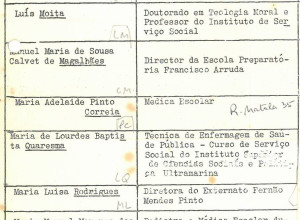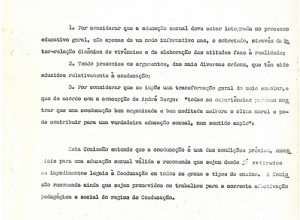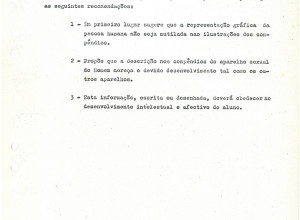
This month, we highlight a selection of documents from the archive donated to the Centre by Luís Moita.
The documents, produced in the context of his activities prior to 25 April 1974, during the period known as the ‘Marcelist Spring’, are the result of Luís Moita's involvement as a member of the then newly created (January 1971) Commission for the Study of Education and Sexuality, the result of a proposal by Albino Aroso, Professor of Hygiene at the Faculty of Medicine, who was also one of the first leaders of the Association for Family Planning. The Commission included several officials linked to Public Health and School Health, educators and other education specialists.
The main proposals were surprising at the time for their boldness and content, which is still relevant today: 1 - A broad understanding of the concept of sexuality, which was not reduced to genital behaviour and which influences ‘being in the world as a man or woman’; 2 – That sexuality cannot be seen in a static way, but as dynamic and culturally shaped; 3 – That in understanding human sexuality, dimensions such as desire and openness to communication are particularly important, and that it is experienced as a source of pleasure and a privileged form of expression of love.
In early 1973, the Commission was pressured to halt its work by the dictatorship that was in power in Portugal, without ever seeing any of its texts published.
Although the basic text was not completed, important recommendations were made to the Minister of Education (Veiga Simão), namely on the importance of not mutilating maps and diagrams of the human body in school textbooks. Another important action of this Commission was its participation in the Law on Co-Education, which was finally approved in early 1973, giving rise to mixed education in public schools.
Luís Moita, born on 11 August 1939, was a progressive Catholic activist in the early 1970s, while teaching moral theology at the Olivais Seminary. In 1971, Luís Moita reacted to Cardinal Cerejeira's intention to transfer seminarians to the Catholic University, which would have made it impossible to train a new type of priest. He left the priesthood and entered politics before the 25th of April revolution, during which he was arrested and tortured in Caxias. He contributed to the Cadernos GEDOC and the Boletim Anti-Colonial, as a result of the vigil for peace and the events at the Capela do Rato, twelve civil servants were dismissed by decision of the Council of Ministers, including Francisco Pereira de Moura and himself. During the PREC, he was involved in defending causes and projects in areas of the revolutionary left. He was an advisor to Jorge Sampaio in the IV Provisional Government, responsible for cooperation with Africa, and Secretary of State for Emigration in the V Provisional Government in 1975. For 15 years, between 1974 and 1989, he headed CIDAC, a Portuguese non-governmental organisation for development cooperation. From the 1980s onwards, he devoted himself fully to the University.





